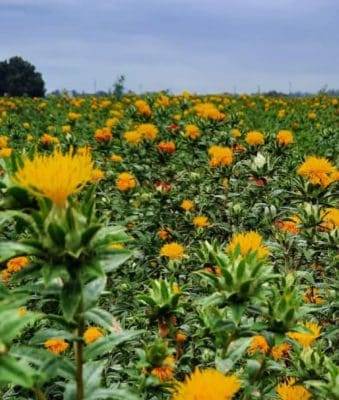
Miruku’s Dr Abby Thompson presents at CSIRO’s Protein Futures event. Photo: CSIRO
NEW ZEALAND molecular farming start-up, Miruku, has plans to grow its genetically modified safflower varieties in Australia, with the seed set to be processed into dairy-substitute ingredients.
Founded in 2021, the start-up is developing varieties to grow oils that mimic proteins found in dairy.
Miruku chief operating officer Abby Thompson told CSIRO’s recent Protein Futures event that the company was targeting Australia as the first location to grow its initial crop.
She said the safflower variety was being developed to mimic beta casein, a dairy protein that gives cheese its stretch.

A GMO safflower variety was approved for commercial production in Australia in 2018. Photo: GRDC
“What we are trying to do is produce affordable, scalable ingredients,” Dr Thompson said.
“This is going to be done using the power of sunlight and CO2.”
Dr Thompson said safflower was the ideal initial crop target as it had “a number of agronomic benefits and food-manufacturing benefits”.
“It’s pretty under-served in terms of the knowledge out there compared to its cousins soy and canola.”
She said Miruku currently has two patents for its plant genetic-modification techniques, and was investigating which growing regions to trial the genetically modified (GMO) and non-GMO safflower varieties.
“We are looking at multiple regions in Australia.
“I believe that we’ve got non-modified safflower going in the ground shortly and, with our modified one, we will be starting to discuss where to plant that hopefully soon.”
Dr Thompson said the company hoped to provide another sustainable, economical crop option for growers, as well as offering food brands like-for-like plant-based dairy ingredients.
“The traditional safflower varieties are not particularly profitable for farmers.
“By add[ing] that dairy protein into the protein fraction, we have that ability to lift the value of the seed quite significantly.”
Minimal processing
Unlike other methods used to manufacture plant-protein ingredients, Dr Thompson said the system used to turn the oilseed into dairy protein would have a “minimum-processing approach”.
She said the process would be similar to those used to make oat and almond milks, with most of the work done by the plant in the paddock.
“We are also trying to take a more minimum-processing approach because we know that many of the foods companies that are wanting to use our ingredients have a really tight margin that they are able to spend on their ingredients.”
Dr Thompson said Miruku was also aiming to have uses for all parts of the safflower plant which would have manufacturing and sustainability benefits.
“Initially we will be focusing on the fats and proteins part of the seed but ultimately, we really believe we have to be able to use as much of that seed for human consumption purposes as we possibly can.”
Australian regulations
Dr Thompson said the company also targeted Australia for the crop trials because of the positive regulatory framework currently in place.
“We see that as a real opportunity for us…in terms of the speed to market, because we think we will be able to more easily reassure the regulators that we will be able to control our modified seeds and keep them separated from the non-modified varieties.”
GMO and non-genetically modified varieties of safflower are or have been grown in Australia.
Currently, safflower is one of only a handful of GMO crops approved for cultivation in Australia, alongside cotton, canola and Indian mustard.
A super high-oleic safflower variety, developed by the CSIRO, GRDC and GO Resources, was approved for commercial production in 2018.
It was marketed as an oilseed crop designed as a substitute for palm and crude oils used in industrial lubricants and transformer oils, as well as in cooking oils.
Safflower plantings stagnate
Initially there was strong interest in traditional canola-growing areas to trial the SHO safflower variety; however, finding reliable supply chains has appeared to dampen its appeal.
In the July 2022 report, the Australian Oilseeds Federation said interest in the crop continued to grow “with expansion into WA this season following positive trials last season”.
AOF reported that up to 20,000ha of safflower could be planted for the 2022-23 season.
GRDC estimated about 12,000ha of SHO would be grown in Australia in 2023.
Held in Sydney on May 28-29, CSIRO’s Proteins Futures recent symposium brought together protein and food innovators to discuss the challenges and opportunities for Australia’s animal and plant-protein industry.
Grain Central: Get our free news straight to your inbox – Click here

HAVE YOUR SAY